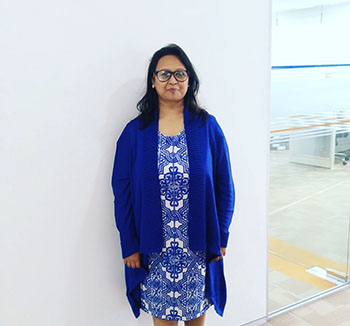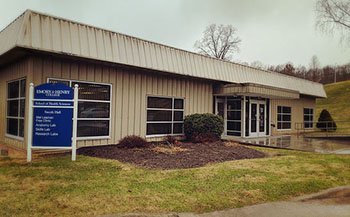For 15+ years, through the BD Volunteer Service Trip program, BD has been sending teams of employee volunteers to share their time and talents to help non-profit organizations expand healthcare access to vulnerable patients in underserved communities around the world.

Due to the pandemic and local regional restrictions, BD volunteers are currently unable to physically travel for in-person service activities, so the company created virtual service opportunities for employees to “give back,” from the safety of their homes.
BD volunteer Sushmita Bandopadhyay is a communications leader in New Delhi, India. She previously participated in a BD Volunteer Service Trip in 2014 and recently, she joined employees across the company (and around the world) for a virtual volunteer experience coordinated by two BD non-profit partners: PYXERA Global and the National Association of Free and Charitable Clinics (NAFC). Below, she shares highlights from the experience.
Participating in a BD-sponsored Volunteer Service Trip to Haiti in 2014 was truly life-changing for me, so I was excited to learn just a few months ago that BD was sponsoring a new, virtual volunteer opportunity to serve community health centers in the United States.
After applying and interviewing for the volunteer assignment, I was thrilled to learn that this particular project was in need of volunteers like me, with communications and marketing experience. I was one of 18 BD colleagues from around the world to be selected to participate in this unique, two-week virtual service opportunity.
Volunteering helped me learn about the role community health centers play in caring for vulnerable patients
My fellow BD volunteers and I were quickly divided into teams, and each team was assigned to help one of five free health clinics that serve vulnerable populations in various regions throughout the United States. My team was tasked with building a marketing communications plan for Mel Leaman Free Clinic (MLFC), which has been providing free, comprehensive, and high-quality health care services to underserved patients in Appalachian regions of Virginia for two decades.

I soon learned that, like all free clinics, MLFC does not receive reimbursement from patients or insurers for the healthcare services it provides; and is entirely dependent on private and federal grant funding and donations. We also discovered that, while clinics like MLFC always face some level of struggle when it comes to recruiting enough volunteers and funding to fulfill their missions, COVID-19 has put a huge strain on available grant funding. The pandemic has also made recruiting healthcare volunteers nearly impossible.
Each of the BD volunteer teams who participated in this effort were tasked with leveraging their marketing communications skillsets to help their clinic partners overcome challenges similar to the ones MFLC is facing. Some needed help raising awareness of their services to potential patients; others needed help attracting financial support from potential donors.
Serving an Appalachian health clinic from my home in New Delhi
As we kicked off the effort, I was struck by the realization that I had never imagined that sitting in my home in New Delhi, India, I would ever get the chance to serve a health clinic in the Appalachian region of the U.S.!
Our diverse volunteer team, comprised of two volunteers from India and one from the U.S., quickly got to work identifying the objectives and deliverables for our two-week project, and scheduled recurring check-ins with the executive director of the clinic. Her insights would prove invaluable – especially since she’s been serving this clinic since it opened in 2001.
It’s inspiring to think what our small but mighty volunteer team was able to achieve, in such a short amount of time, through collaboration, agility and innovative thinking. We conducted a communications needs assessment, created key messages, secured video and written testimonials from volunteers and patients, developed a position paper, and created a repository of posts that could be leveraged on the clinic’s social media platforms.
Distance can’t stop us from creating heartfelt connections through service
Even though all of our interactions with our free clinic “clients” were virtual, our most precious experiences were my interactions with the clinicians who have committed their lives to serving the patients of MLFC.
I was inspired to have the opportunity to interview Dr. James Patterson, who turned 90 this year, and has been caring for patients at MLFC since 2001.
We were also deeply moved at the end of our service experience, when we handed over our marketing plan to Susan Ferraro, the clinic’s executive director. She shed tears of gratitude for our work and was profusely grateful for our efforts to support the growth of her clinic. It was remarkable to me that a two-week project could mean so much to Susan, a woman who had spent a lifetime in service to others.
These experiences reminded me that we apply our whole hearts and minds to a task at hand, no distance can get in the way of creating heartfelt connections with others.
#proudtobeBD
Although this virtual service experience was different from my BD Volunteer Service Trip to Haiti, it was still, truly another opportunity of a lifetime for me. Even though COVID-19 has restricted how we live and work in so many ways, I’m so grateful for this chance to use my unique skillsets to help underserved healthcare providers and patients who live thousands of miles across the world.
Experiences like this make me truly #proudtobeBD.
Subscribe to receive BD blog alerts